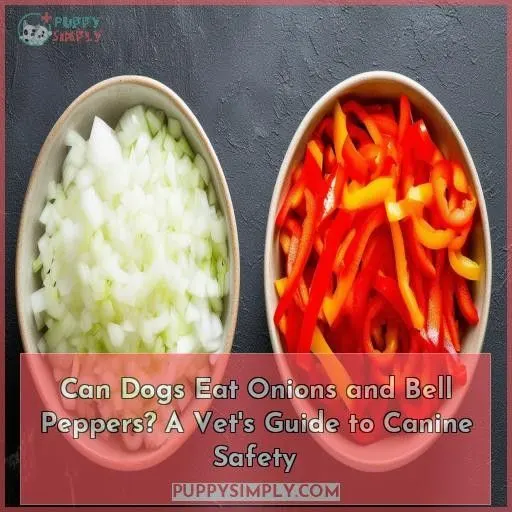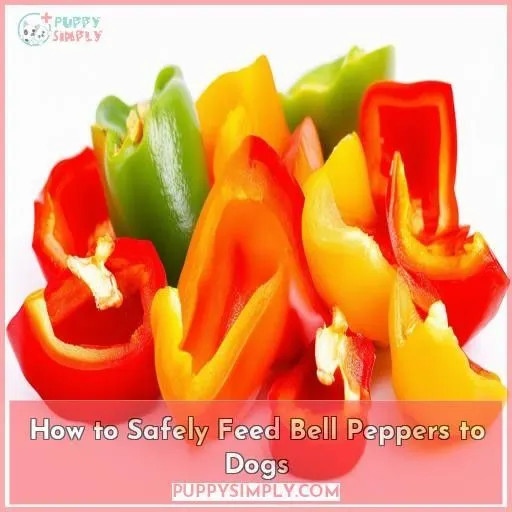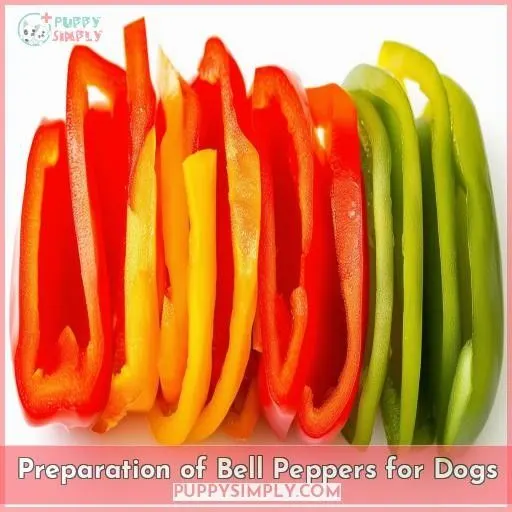This site is supported by our readers. We may earn a commission, at no cost to you, if you purchase through links.

Onions contain compounds that damage a dog’s red blood cells, leading to life-threatening anemia.
In contrast, bell peppers provide a vitamin-packed, fiber-rich treat that supports doggy health. Just remove the seeds, stems, and leaves first.
While you’ll want to go easy on portions, offering bell peppers occasionally can benefit your furry friend’s immunity, vision, and digestion.
So skip the onions, but feel free to share those colorful bell peppers for a healthy snack – your pup will thank you later.
Want to learn the best ways to safely introduce this crunchy delight?
Table Of Contents
- Key Takeaways
- Can Dogs Eat Onions and Bell Peppers?
- Are Onions Toxic to Dogs?
- What Happens if a Dog Eats Onions?
- Are Bell Peppers Safe for Dogs?
- Health Benefits of Bell Peppers for Dogs
- How to Safely Feed Bell Peppers to Dogs
- Feeding Guidelines for Bell Peppers
- Preparation of Bell Peppers for Dogs
- Consult Your Veterinarian
- Frequently Asked Questions (FAQs)
- Will a small amount of onions hurt my dog?
- Can dogs eat cooked bell peppers and onions?
- Can dogs eat food that touched onion?
- Are bell peppers toxic to dogs?
- Can dogs eat onion and pepper plants?
- How much bell pepper is too much?
- Are red peppers better than green peppers?
- Do peppers affect dogs with health conditions?
- What pepper varieties should be completely avoided?
- Conclusion
Key Takeaways
- Onions are a strict no-no for our furry pals, as those tasty bulbs contain compounds that can seriously damage their red blood cells, leading to life-threatening anemia. Even a small amount is enough to cause trouble, so it’s best to keep Fido far away from the onion patch.
- On the other hand, bell peppers are not only safe for our canine companions but also pack a nutritious punch! These colorful veggies are loaded with vitamins, antioxidants, and fiber that can boost your pup’s immunity, vision, and digestion. It’s like a multivitamin in a crunchy package!
- When serving up bell peppers as a treat, remember to start slow and keep portions in check. Moderation is key, as too much of a good thing can lead to doggy tummy troubles. Think of it as a tasty side dish, not the main course.
- And last but not least, always consult with your trusty vet before introducing any new foods to your pup’s menu. Every dog is unique, and their health needs might require a little extra consideration. Better safe than sorry when it comes to your furry best friend’s well-being!
Can Dogs Eat Onions and Bell Peppers?
No, dogs can’t eat onions as they’re toxic to them and can cause oxidative damage to their red blood cells, leading to weakness, vomiting, and other symptoms. However, bell peppers are safe for dogs in moderation and can provide various health benefits like vitamins, fiber, and antioxidants.
Are Onions Toxic to Dogs?
You should never let your dog consume onions. They’re highly toxic to our furry friends and can lead to severe, even life-threatening, poisoning.
Onions damage dogs’ red blood cells, causing oxidative injury. If your pup accidentally ingests onions, they may experience lethargy, weakness, vomiting, diarrhea, and pale gums. The severity depends on the amount consumed relative to their body weight. Even small quantities can be dangerous for smaller breeds.
If you suspect your dog has eaten onions, don’t wait for symptoms – contact your vet immediately. Regarding onion consumption, it’s better to be safe than sorry. Prioritize your dog’s safety by keeping onions well out of reach.
What Happens if a Dog Eats Onions?
If your dog consumes onions, it’s imperative to act swiftly. Onions contain compounds that can cause oxidative damage to a dog’s red blood cells, leading to hemolytic anemia and potentially life-threatening complications.
Onions Can Cause Oxidative Damage to Red Blood Cells
You should know that onions can have toxic effects on your dog. They cause oxidative damage to red blood cells, forming Heinz bodies that destroy the cells, leading to anemia. The toxic compounds in onions subject a dog’s red blood cells to oxidative stress, rupturing them and posing a serious safety risk.
Symptoms Include Lethargy, Weakness, Vomiting, Diarrhea, and Pale Gums
If your dog eats onions, be on the lookout for lethargy, weakness, vomiting, diarrhea, and pale gums. These symptoms indicate oxidative damage to their red blood cells. Monitor closely for digestive upset or dog allergies. For safety, steam bell peppers and avoid onions, ensuring proper beta-carotene conversion. Act quickly if your pup exhibits signs of onion toxicity.
Are Bell Peppers Safe for Dogs?
You’re probably wondering if bell peppers are a safe treat for your furry friend after learning about the dangers of onions. The good news is, bell peppers of all colors are perfectly safe for dogs!
They’re packed with nutritional content like vitamins A, C, E, and K. Whether feeding cooked or raw bell peppers, just remove the seeds, stems, and any leaves first.
Red peppers offer the most vitamins, but any color provides valuable nutrients as part of your pup’s well-balanced diet. So feel free to let your dog enjoy bell peppers as an occasional healthy snack!
Health Benefits of Bell Peppers for Dogs
You’ll be pleased to know that bell peppers are packed with essential vitamins and nutrients that can greatly benefit your dog’s health. Their rich content of vitamins A, C, E, B6, and K, along with beta-carotene and fiber, supports vision, immune function, digestion, and overall well-being in dogs.
Rich in Vitamins A, C, E, B6, and K
Bell peppers are a nutritional powerhouse, providing vitamins A, C, E, B6, and K, which support your pup’s immunity, bones, and vision health through their antioxidant properties.
Contain Beta-carotene, Supporting Vision and Immune Function
The antioxidant beta-carotene in colorful bell peppers – red, yellow, orange, and green – supports your pup’s vision and immune function.
Provide Fiber, Aiding Digestion and Promoting Fullness
Bell peppers provide fiber which aids digestion and promotes fullness. They offer bulk, slow digestion, and a feeling of satiety—ideal for weight loss. Serve peppers as a healthy, fibrous snack.
Antioxidants Help Reduce Inflammation and Support Overall Health
Bell peppers’ antioxidants reduce inflammation, boost immunity, and promote overall health. Their vitamins combat oxidative stress from environmental factors, supporting your pup’s wellbeing.
How to Safely Feed Bell Peppers to Dogs
When feeding bell peppers to your dog, it’s important to introduce them gradually and in moderation as a treat. Remove the seeds, stems, and leaves before offering cooked or raw bell peppers without any seasoning or salt, and make sure your furry friend has access to fresh water.
Introduce Slowly and in Moderation as a Treat
You’ll want to introduce bell peppers slowly and in moderation as treats to prevent digestive upset. Start with small pieces and monitor for any allergies or adverse reactions.
Remove Seeds, Stems, and Leaves Before Feeding
To prevent digestive discomfort, remove:
- Seeds
- Stems
- Leaves
Chop peppers into bite-sized pieces to avoid choking hazards and aid digestion.
Offer Cooked or Raw, Without Any Seasoning or Salt
You can offer your dog bell peppers raw or cooked, without any seasoning or salt. Raw peppers are crunchy treats, while cooked ones are softer and digestible for all dog-friendly vegetables.
Provide Water When Feeding Bell Peppers
You’ll want to provide fresh water when offering bell peppers as treats. Staying hydrated aids digestion, and the fiber, crunch, and nutrients in peppers benefit from proper hydration.
Feeding Guidelines for Bell Peppers
When feeding bell peppers to dogs, it’s crucial to limit their intake to no more than 10% of their daily treat calories.
Large dogs should consume less than half a bell pepper, while small dogs should have less than a quarter of a bell pepper.
Always monitor your dog for any signs of digestive upset or allergic reactions after introducing bell peppers to their diet.
Limit to 10% of Daily Treat Calories
Treat bell peppers as occasional goodies, limiting their daily serving to 10% of your pup’s overall treat calories. This moderate approach makes sure peppers remain a tasty yet healthy indulgence, avoiding potential issues like dehydration or urinary troubles from overfeeding.
Large Dogs: Less Than 1/2 Pepper
For larger furry friends, you’ll want to limit bell pepper servings to less than half a pepper. Too much can cause digestive issues, so moderation is key with these tasty veggie treats.
Small Dogs: Less Than 1/4 Pepper
For small dogs, offer no more than 1/4 of a bell pepper as a treat, adjusting portions based on breed and daily calorie requirements. Cooking softens the pepper’s tough skin, mitigating potential digestive issues.
Monitor for Any Digestive Upset or Allergic Reactions
If your dog shows signs of digestive upset or allergic reactions like vomiting, diarrhea, or skin irritation after eating bell peppers, stop feeding them and consult your vet immediately. Capsaicin in spicy peppers can also be toxic, so avoid those varieties.
Preparation of Bell Peppers for Dogs
When preparing bell peppers for your dog, be sure to steam or puree them to make them easier to consume and remove any tough outer skin. Never add onions, garlic, or other seasonings as these can be harmful to dogs, and avoid feeding spicy pepper varieties altogether.
Steam or Puree for Easier Consumption
If your pup has trouble chewing raw peppers, steaming or pureeing them can make them easier to digest and reduce the risk of digestive upset or choking. Cooked peppers also have slightly lower nutritional levels than raw.
Remove Tough Outer Skin if Necessary
If your dog has trouble digesting bell peppers’ tough outer skin, you may want to peel it off before serving. This extra preparation step can make pepper consumption easier for some canines, preventing potential skin inflammation or allergies.
Never Add Onions, Garlic, or Other Seasonings
When preparing bell peppers, never add onions, garlic, or other seasonings as these are toxic to dogs. Instead, opt for:
- Fresh herbs (parsley, dill, basil)
- Unseasoned broth for moisture
- Plain yogurt for added protein
- Cooked, unseasoned meats for flavor
- Simple spices like pepper or turmeric
Safe treats are key to your pup’s health and happiness!
Avoid Feeding Spicy Varieties
You’ll want to avoid feeding your dog spicy varieties like chili or jalapeño peppers. The capsaicin can irritate their gastrointestinal tract, causing vomiting, diarrhea, and discomfort. Stick to sweet bell peppers for safe, nutritious treats under veterinary guidance.
Consult Your Veterinarian
It’s essential to consult your veterinarian before introducing new foods like bell peppers to your dog’s diet. Your vet can provide personalized guidance, monitor for any adverse reactions, and guarantee the proper nutritional balance for your pet’s specific needs.
Check With Your Vet Before Introducing Any New Foods
Before introducing bell peppers or any new food to your dog’s diet, consult your veterinarian for professional guidance. Every canine has unique nutritional needs and potential allergies to keep in mind. Your vet can advise if bell peppers are a safe, nutritious treat for your furry companion based on their individual health profile and any precautions necessary.
Monitor Your Dog Closely for Any Adverse Reactions
While bell peppers offer nutritional benefits, always monitor your dog closely when introducing new foods.
Look for any symptoms like vomiting, diarrhea, or lethargy, which could indicate an allergy or digestive upset.
Prevention is key, so start with small portions and consult your vet if you notice adverse reactions.
Diligent monitoring helps ensure your furry friend stays happy and healthy.
Frequently Asked Questions (FAQs)
Will a small amount of onions hurt my dog?
One in five pets swallows something toxic yearly. Onions can severely damage your dog’s red blood cells, leading to life-threatening anemia. Even small amounts are unsafe, so avoid feeding onions completely.
Can dogs eat cooked bell peppers and onions?
You should never feed dogs onions as they’re toxic. However, cooked bell peppers are safe and a good source of vitamins. Remove seeds, stems, and introduce slowly to avoid stomach upset.
Can dogs eat food that touched onion?
No, you shouldn’t let your dog eat food that has touched onions. Onions contain compounds toxic to dogs that can cause serious issues like gastrointestinal irritation and red blood cell damage. It’s best to keep onions completely away from your furry friend’s diet.
Are bell peppers toxic to dogs?
No, bell peppers aren’t toxic for dogs. These crunchy veggies offer key nutrients like vitamins A and C. Just remove the seeds and stems, and feed them cooked or raw as an occasional treat. Moderation is key to prevent digestive issues.
Can dogs eat onion and pepper plants?
Imagine your pup munching on those tantalizing plants – a horticultural horror show! Dogs should never consume onions or pepper plants as they contain toxic compounds that can wreak havoc on their gastrointestinal system. Stick to pet-safe veggies for your furry friend’s well-being.
How much bell pepper is too much?
Limit bell peppers to 10% of your dog’s daily treat calories. For small dogs, serve no more than 1/4 pepper per day; for larger breeds, keep it under 1/2 pepper. Introduce slowly and watch for digestive issues. Moderation is key when adding new foods.
Are red peppers better than green peppers?
Yes, red bell peppers are more nutritious for dogs than green ones. They’re packed with 11 times more beta-carotene, plus higher levels of folate, potassium, and lutein – beneficial antioxidants your pup needs.
Do peppers affect dogs with health conditions?
You’ll want to be cautious with peppers if your pup has health issues. Some conditions, like kidney disease or pancreatitis, may limit veggie intake. Always consult your vet before introducing new foods.
What pepper varieties should be completely avoided?
You should completely avoid feeding your pup any hot peppers like jalapeños, habaneros, or chili peppers. These spicy varieties contain capsaicin, a compound that can severely irritate a dog’s digestive system.
Conclusion
Envision your pup savoring a crunchy, vitamin-rich bell pepper treat – a delightful indulgence when portioned correctly. While can dogs eat onions and bell peppers is an apt question, onions are strictly off-limits due to their toxicity. With your vet’s guidance, offer bell peppers responsibly for a boost of nutrients and fiber that supports your furry friend’s well-being.














